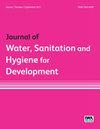让男孩参与孟加拉国学校的经期卫生管理干预:评估可接受性和可行性的试点研究
IF 1.4
4区 环境科学与生态学
Q3 WATER RESOURCES
Journal of Water Sanitation and Hygiene for Development
Pub Date : 2023-01-19
DOI:10.2166/washdev.2023.153
引用次数: 0
摘要
对男孩进行关于青春期和月经的教育被认为有助于减少对月经的耻辱感和消极态度。我们为女孩和男孩制定并试行了一项基于学校的干预措施,以增加对青春期的了解,并为月经来潮的女学生营造一个更有利的环境。在这个子研究中,我们报告了来自男生的数据。我们进行了24次形成性深度访谈和4次小组小短文练习来制定干预方案。然后,我们进行了干预前和干预后的调查,并进行了四次后续焦点小组讨论,以确定干预方案在男生中的可行性、可接受性和效果,并提出扩大规模的建议。在形成阶段,男孩对青春期知之甚少,但认为青春期教育对所有人都至关重要。干预后,男孩的月经意识较基线有所提高[PD: 15%;95%置信区间(CI): 2,29]。据报道,在学校俱乐部或与朋友讨论青春期相关问题的舒适度也增加了[PD: 13%;95% ci: 2,24]。在焦点小组中,男孩们报告说,他们发现这些课程很有帮助,而且内容丰富。男生的参与,加上提供良好的干预材料以及社会和行为改变的沟通干预措施是可行的,并有助于在学校建立一个更加支持和对女孩友好的环境。本文章由计算机程序翻译,如有差异,请以英文原文为准。
Engaging boys in menstrual hygiene management (MHM) interventions in Bangladeshi schools: a pilot study to assess acceptability and feasibility
Educating boys about puberty and menstruation has been hypothesized to aid in reducing menstrual stigma and negative attitudes about menstruation. We developed and piloted a school-based intervention for girls and boys to increase knowledge about puberty and foster a more supportive environment for menstruating schoolgirls. In this sub-study, we report on data from the schoolboys. We conducted 24 formative in-depth interviews and four group vignette exercises to develop the intervention package. We then carried out pre-and post-intervention surveys and conducted four follow-up focus group discussions to determine the feasibility, acceptability, and effects of the intervention package among schoolboys and to develop recommendations for scale-up. During the formative phase, boys reported minimal knowledge concerning puberty but felt puberty education was vital for all. Following the intervention, boys' awareness of menstruation increased compared to baseline [PD: 15%; 95% confidence interval (CI): 2, 29]. The reported comfort level of discussing puberty-related issues in a school club or with friends also increased [PD: 13%; 95% CI: 2, 24]. In focus groups, boys reported finding the sessions helpful and informative. Engagement of schoolboys, combined with well-delivered intervention materials and social and behavior change communication interventions is feasible and can contribute to a more supportive and girl-friendly environment in schools.
求助全文
通过发布文献求助,成功后即可免费获取论文全文。
去求助
来源期刊

Journal of Water Sanitation and Hygiene for Development
WATER RESOURCES-
CiteScore
3.10
自引率
11.80%
发文量
58
审稿时长
16 weeks
期刊介绍:
The Journal of Water, Sanitation and Hygiene for Development is a peer-reviewed journal devoted to the dissemination of high-quality information on the science, policy and practice of drinking-water supply, sanitation and hygiene at local, national and international levels.
 求助内容:
求助内容: 应助结果提醒方式:
应助结果提醒方式:


